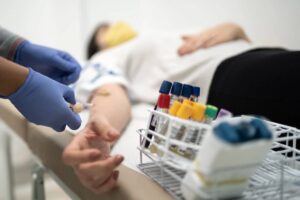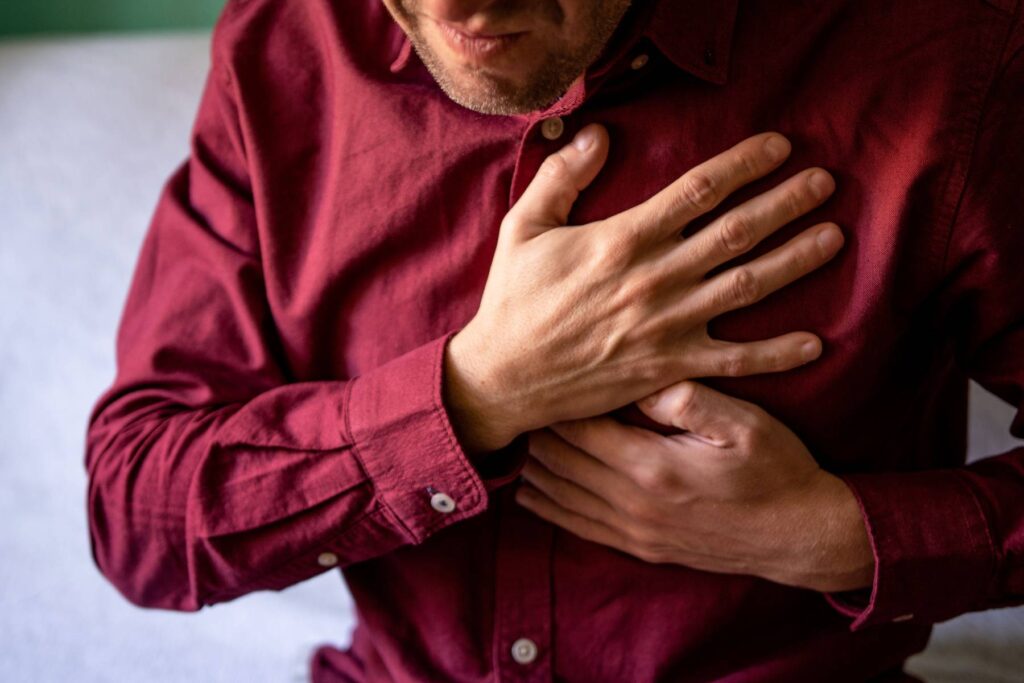Experiencing a heart attack can be scary, and the recovery process may feel overwhelming. It’s normal to feel uncertain about what comes next, but the good news is that with the right steps, you can regain your strength and improve your life after a heart attack.
The road to recovery doesn’t have to be a lonely one—many people have been through this and come out healthier and stronger. In this blog, we’ll walk you through simple tips on what to do and what to avoid during your recovery. Step by step, we’ll help you feel more confident and ready to get back to living your life. Let’s get started!
Contents
How Do You Feel After a Heart Attack?
 Recovering from a heart attack is a physical and emotional journey, and it’s normal to feel a range of emotions and physical symptoms during this time. Here are some things you might experience:
Recovering from a heart attack is a physical and emotional journey, and it’s normal to feel a range of emotions and physical symptoms during this time. Here are some things you might experience:
-
Physical Fatigue:
Your body has gone through a lot, and it’s common to feel tired or weak as it heals. Don’t push yourself too hard—take it slow and rest when you need to. -
Shortness of Breath:
Many people feel winded or out of breath during recovery, especially when they start moving more. This is normal as your heart heals, but if it gets worse, make sure to contact your doctor. -
Chest Discomfort or Pain:
Some discomfort in your chest can be expected during the recovery process, but it should gradually decrease. If you experience any severe or persistent pain, seek medical advice immediately. -
Emotional Changes:
It’s common to feel anxious, depressed, or even scared after a heart attack. The fear of another heart attack can weigh heavily, but it’s important to address these emotions. Speaking to a counselor or support group can be really helpful. -
Difficulty Sleeping:
Anxiety or discomfort may make it hard to sleep, but it’s important to prioritize rest. Establish a calm routine before bed to improve your sleep quality. -
Increased Sensitivity to Stress:
Your body may react more strongly to stress as it recovers. Learning to manage stress through relaxation techniques like deep breathing, yoga, or meditation can help. -
Changes in Appetite:
Some people lose their appetite or feel like eating less after a heart attack. Others may overeat for comfort. A balanced, heart-healthy diet is key to a successful recovery.
Remember, everyone’s recovery experience is unique, and it’s okay to have ups and downs. Pay attention to your body’s signals, take it easy, and reach out for support when needed.
What is the Recovery Time for a Heart Attack?

The recovery time after a heart attack varies from person to person, depending on the severity of the attack, overall health, and how well the person follows their recovery plan. However, here’s a general idea of what to expect:
-
Initial Recovery (First Few Days to Weeks):
-
During the first few days, you’ll likely be in the hospital for observation and treatment. The focus will be on stabilizing your condition, managing pain, and starting medications. You may feel weak and fatigued during this time, which is normal.
-
-
Early Recovery (4-6 Weeks):
-
After discharge, most people are able to resume light activities, like walking or simple household tasks, within 1-2 weeks. Physical activity is encouraged, but it should be gradual and approved by your doctor. By the end of 4-6 weeks, you may be able to return to work or other regular activities, depending on how well you’re recovering.
-
-
Cardiac Rehabilitation (3-6 Months):
-
Many people are enrolled in a cardiac rehabilitation program, which is a structured plan that includes exercise, education, and emotional support to help improve heart health and prevent future problems. This phase typically lasts 3-6 months.
-
-
Full Recovery (6 Months to 1 Year):
-
While most people feel better after 6-8 weeks, complete recovery may take up to a year. The heart continues to heal, and you’ll likely see improvements in energy levels and overall health as time goes on. Lifestyle changes, including a healthy diet, exercise, and stress management, will play a big role in the recovery process.
-
Remember, the recovery process is unique for everyone, and it’s important to listen to your body. Regular follow-ups with your doctor will help track progress and ensure a safe and successful recovery.
What To Do For a Faster Recovery After a Heart Attack
Consume a Heart-Healthy Diet
 A heart-healthy diet is crucial to your recovery after a heart attack. Eating the right foods helps your heart heal, reduces the risk of future problems, and supports overall well-being. Here’s why and how to improve your diet:
A heart-healthy diet is crucial to your recovery after a heart attack. Eating the right foods helps your heart heal, reduces the risk of future problems, and supports overall well-being. Here’s why and how to improve your diet:
-
These are rich in vitamins, minerals, and antioxidants that help reduce inflammation and support heart health. Aim for a variety of colors on your plate—this will ensure you’re getting a range of nutrients. Examples: Leafy greens, berries, oranges, and carrots.
2. Whole Grains
-
Whole grains are high in fiber, which helps lower cholesterol levels and improves blood circulation. They also help keep you full and provide steady energy. Examples: Brown rice, quinoa, whole wheat bread, oats.
3. Lean Proteins
-
Lean proteins are important for muscle repair and recovery. They provide essential amino acids without the saturated fat found in red meats. Examples: Skinless poultry, fish (especially fatty fish like salmon), beans, and legumes.
4. Healthy Fats
-
Healthy fats, like those found in avocados, olive oil, and nuts, can help lower bad cholesterol levels and reduce the risk of heart disease. Omega-3 fatty acids, in particular, are known for their heart-protective benefits. Examples: Fatty fish (salmon, mackerel), walnuts, flaxseeds, olive oil.
5. Foods to Avoid
- Processed Foods: These often contain unhealthy fats, added sugars, and excess salt. They can increase the risk of high blood pressure and cholesterol levels.
- Excess Salt: Too much salt can lead to high blood pressure, which puts added strain on your heart.
- Unhealthy Fats: Saturated fats and trans fats can raise bad cholesterol levels and contribute to artery blockage. Avoid fried foods, butter, and fatty cuts of meat.
6. Hydration
-
Drink plenty of water throughout the day. Staying hydrated helps your heart function better and supports overall recovery.
Adopting a heart-healthy diet is one of the most important steps you can take in your recovery after a heart attack. By choosing the right foods and avoiding harmful ones, you can support your heart’s healing process and reduce the risk of future heart problems.
Follow Medications and Lifestyle Changes Post-Heart Attack
 After a heart attack, medications and lifestyle changes are essential for preventing further heart problems and promoting recovery. Here’s a quick overview:
After a heart attack, medications and lifestyle changes are essential for preventing further heart problems and promoting recovery. Here’s a quick overview:
Common Medications: Taking medications as prescribed is crucial to avoid complications. Missing doses or stopping medications can increase the risk of another heart attack.
- Blood Thinners: Help prevent blood clots, reducing the risk of another heart attack or stroke.
- Statins: Lower cholesterol levels and help prevent further plaque buildup in the arteries.
- Beta-blockers: Help reduce heart rate and blood pressure, easing the heart’s workload.
- ACE Inhibitors: Relax blood vessels, lowering blood pressure and improving heart function.
Lifestyle Changes
- Quit Smoking: Smoking damages blood vessels and increases the risk of further heart problems.
- Limit Alcohol: Excessive drinking can raise blood pressure and harm the heart.
- Healthy Diet: Continue with a heart-healthy diet, focusing on fruits, vegetables, and lean proteins.
- Exercise: Engage in regular, doctor-approved physical activity to improve circulation and heart strength.
- Stress Management: Practice stress-reducing techniques like meditation, yoga, or deep breathing.
Combining medications with positive lifestyle changes will help ensure long-term heart health, prevent another heart attack, and improve overall quality of life.
Engage in Regular Physical Activity
 Exercise is a critical component of heart attack recovery. It strengthens the heart, improves circulation, and helps you regain your overall fitness. Here’s why physical activity is so important and how to get started:
Exercise is a critical component of heart attack recovery. It strengthens the heart, improves circulation, and helps you regain your overall fitness. Here’s why physical activity is so important and how to get started:
-
After a heart attack, it’s important to begin with light activities, like walking or gentle stretching. These activities help improve circulation without overloading your heart.
-
As you recover, you can gradually increase the intensity of your exercises. Simple exercises like light jogging, cycling, or swimming can help strengthen the heart and improve stamina.
-
Many people benefit from cardiac rehabilitation programs, which provide supervised exercise, education, and support. Programs include a mix of aerobic exercises, strength training, and flexibility exercises tailored to your specific needs and recovery stage.
-
Regular physical activity helps your heart pump more efficiently by improving blood flow and reducing strain on the heart.
-
Exercise also helps lower blood pressure, reduce cholesterol levels, and prevent the buildup of plaque in the arteries.
-
Regular exercise contributes to better mental health, helping reduce stress, anxiety, and depression often experienced during recovery.
Starting slowly, following a structured rehabilitation plan, and gradually increasing activity can strengthen your heart and promote long-term health. Always consult your doctor before beginning any new exercise regimen to ensure it’s safe for you.
Manage Stress & Take Care of Your Mental Health
 Recovering from a heart attack isn’t just about your physical health—it’s just as important to look after your mental and emotional well-being. Many people experience anxiety, depression, or even fear of having another heart attack. These feelings are completely normal, but they can also be overwhelming if left unchecked. Here’s how you can manage stress and take care of your mental health:
Recovering from a heart attack isn’t just about your physical health—it’s just as important to look after your mental and emotional well-being. Many people experience anxiety, depression, or even fear of having another heart attack. These feelings are completely normal, but they can also be overwhelming if left unchecked. Here’s how you can manage stress and take care of your mental health:
- Don’t ignore these emotions—acknowledge them and understand that recovery is a process, not just physically but mentally too.
- Practice mindfulness and deep breathing.
- If you’re feeling depressed or anxious, talk to a healthcare professional. Therapists or counselors can provide support and teach you coping strategies to manage stress and mental health.
- Lean on your support network—family, friends, or even a support group. Talking to someone you trust can make a world of difference in relieving stress and feeling less isolated.
- Don’t overwhelm yourself with big expectations. Set small, achievable goals for yourself each day—whether it’s taking a short walk, eating a heart-healthy meal, or simply getting out of bed and moving around. These little victories can build your confidence and reduce stress.
It’s normal to experience emotional ups and downs after a heart attack, but remember, managing stress and mental health is just as important as physical recovery. Take it one day at a time, reach out for support when needed, and make self-care a priority.
What Not to Do During Your Heart Attack Recovery
While recovery from a heart attack requires patience and care, it’s just as important to know what to avoid during this time. Here are some key things you should not do as you recover:
- Don’t Skip Medications
- Don’t Overexert Yourself
- Don’t Ignore Chest Pain or Discomfort
- Don’t Smoke or Use Tobacco
- Don’t Consume Excessive Alcohol
- Don’t Avoid Follow-Up Appointments
- Don’t Isolate Yourself
- Don’t Neglect a Heart-Healthy Diet
Recovery from a heart attack is a delicate process. Knowing what to avoid—whether it’s certain behaviors, activities, or habits—will help you heal faster and reduce the risk of future complications. Focus on your health, listen to your doctor, and take one step at a time toward a healthier future.
Conclusion
Recovering from a heart attack is challenging, but with the right care, patience, and support, you can rebuild your health and live a full life again. Remember, following your doctor’s advice, making heart-healthy lifestyle choices, and staying consistent with your medications are key to your recovery journey. If you’re experiencing any concerns or need guidance along the way, don’t hesitate to reach out for professional help.
If you’re facing any heart-related problems or need assistance in navigating your recovery, consult a heart specialist today. At MantraDoc, our expert cardiologists are here to guide you every step of the way.

